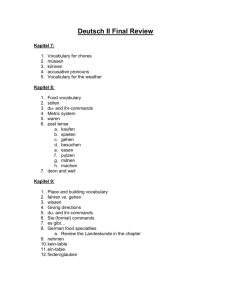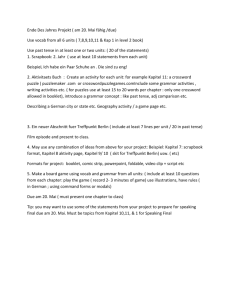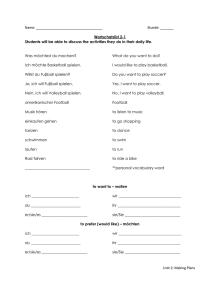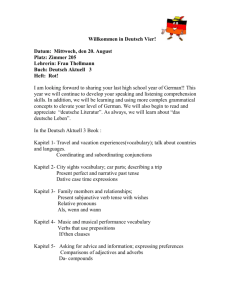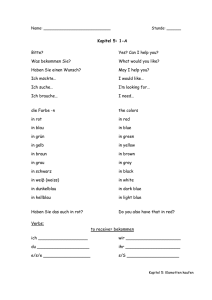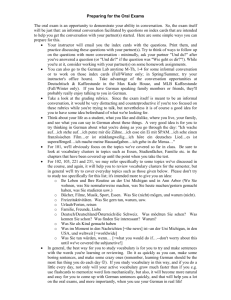Kapitel 6:1
advertisement
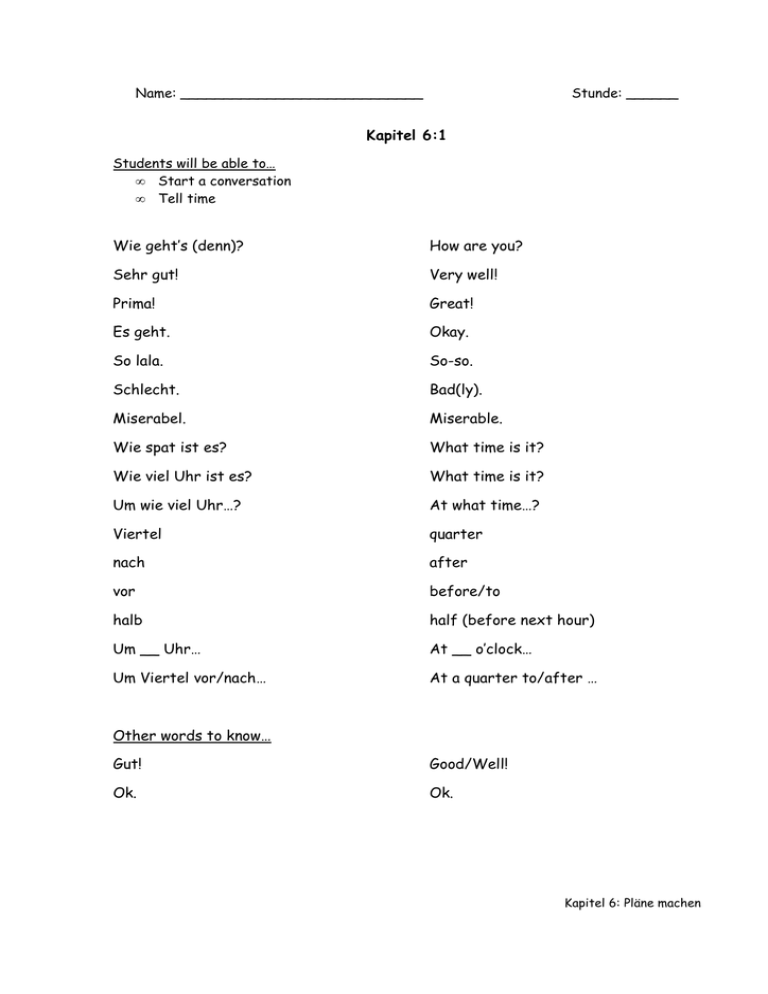
Name: ____________________________ Stunde: ______ Kapitel 6:1 Students will be able to… • Start a conversation • Tell time Wie geht’s (denn)? How are you? Sehr gut! Very well! Prima! Great! Es geht. Okay. So lala. So-so. Schlecht. Bad(ly). Miserabel. Miserable. Wie spat ist es? What time is it? Wie viel Uhr ist es? What time is it? Um wie viel Uhr…? At what time…? Viertel quarter nach after vor before/to halb half (before next hour) Um __ Uhr… At __ o’clock… Um Viertel vor/nach… At a quarter to/after … Other words to know… Gut! Good/Well! Ok. Ok. Kapitel 6: Pläne machen Name: ____________________________ Stunde: ______ Kapitel 6:2A Students will be able to… • Make plans Wohin? Where (to)? in ein Café/ ins Café to a café in Eis essen to eat ice cream in die Stadt gehen to go into the city ins Schwimmbad gehen to go to the pool ins Kino gehen to go to the movie theater in eine Disko gehen to go to the disco tanzen gehen to go dancing ins Konzert gehen to go to the concert wollen to want to Other words to know… baden gehen to go swimming einen Film sehen to see a movie in ein Konzert gehen to go to a concert Verb Conjugation wollen = to want to ich _____________________ wir ______________________ du _____________________ ihr ______________________ e/s/e ___________________ s/S ______________________ Kapitel 6: Pläne machen Name: ____________________________ Stunde: ______ Seite 166-167 The verb “wollen” (meaning: to want to) is one of the modal verbs. Modal verbs do fun things to sentences in the German. You learned a little about them last year when you learned about “möchten” (meaning: would like to). Conjugation of Modal Verbs: As you notice in the conjugation chart on the previous page, the ich & e/s/e forms are identical to one another. The du form is similar to the ich & e/s/e form, but still gets the –st ending. The wir & sie/Sie forms are identical to one another also. The ihr form is similar to the wir & sis/Sie form, but gets the –t ending. Using Modal Verbs in sentences: The modal verb gets conjugated and put into the sentence or question where the verb should go. Then the action verb (ex: gehen, schwimmen, tanzen) goes to the end of the sentence and into its infinitive form. Sample sentences using “wollen”: No Modal Verb Modal Verb Ich schwimme heute um 3 Uhr. Er geht in die Stadt. Was macht ihr? Frau K, sehen Sie einen Film? Ich will heute um 3 Uhr schwimmen. Er will in die Stadt gehen. Was wollt ihr machen? Frau K, wollen Sie einen Film sehen? Add the word “wollen” into the following sentences: Hörst du Musik? __________________________________________ Ich gehe in ein Café. _______________________________________ Wir gehen tanzen. _________________________________________ Sie macht die Hausaufgaben. _________________________________ Kapitel 6: Pläne machen Name: ____________________________ Stunde: ______ Kapitel 6:3A Students will be able to… • Order food and beverages Was bekommen Sie? What will you have? Ich bekomme… I’ll have… eine (die) Tasse Kaffee a cup of coffee ein (das) Glas Tee a glass (cup) of tee eine Limonade (Limo) a lemon-flavored soda eine Nudelsuppe noodle soup ein (das) Käsebrot cheese sandwich ein (das) Wurstbrot a sandwich with cold cuts eine Pizza pizza einen (der) Eisbecher a dish of ice cream ein (das) Eis ice cream Apfelkuchen apple cake essen to eat Other Words to know: mit Zitrone with lemon mit Brot with bread ohne without Verb Conjugations: essen= to eat ich ______________________ wir ________________________ du ______________________ ihr ________________________ e/s/e ____________________ s/S ________________________ Kapitel 6: Pläne machen Name: ____________________________ Stunde: ______ Kapitel 6:3B Students will be able to… • Talk about how foods taste • Pay a check at a restaurant Wie schmeckt’s? How does it taste? Schmeckt’s? Does it taste good? Sagenhaft! Great! Lecker! Tasty! Delicious! Nicht besonders. Not really. Ich möchte/will zahlen. The check, please. Bitte zahlen. The check, please. Das macht… That comes to… Stimmt schon! Keep the change. Pass auf! Watch out! nun now (showing an order of events) Paying the check in Germany & other German speaking countries: When you are ready to pay at a restaurant, you should ask the waiter or waitress “Bitte zahlen”. When they come to your table, they will write down the prices of the items that you have purchased and then add that up (See page 172). All prices include taxes and tip, but it is customary to round up to the next Euro (€) or if it’s a large group leaving about 1€ per person. Kapitel 6: Pläne machen
